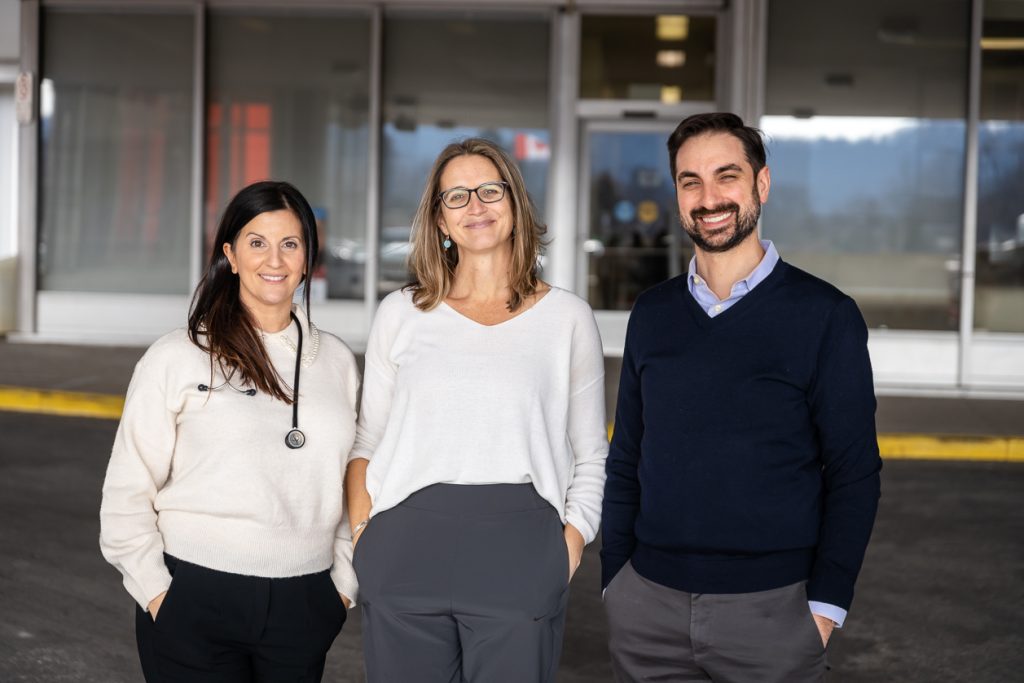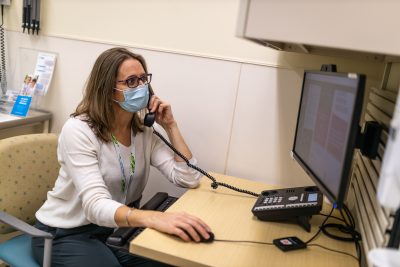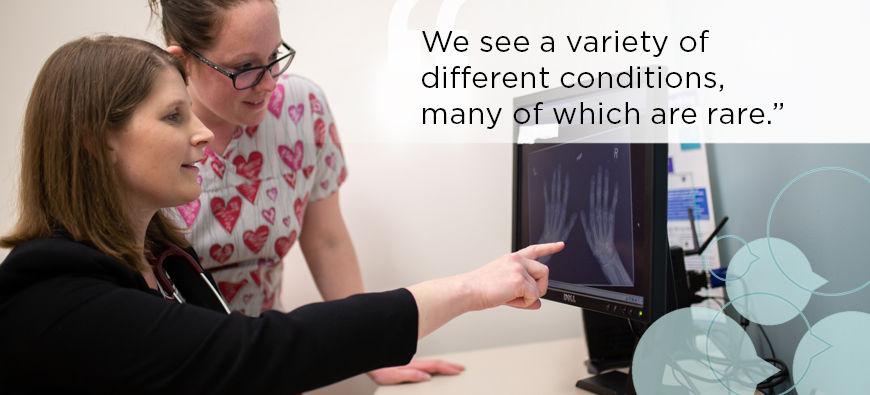
Award-winning HHS clinics support young adult rheumatology patients
Award-winning clinics at Hamilton Health Sciences (HHS) are helping young adults with chronic rheumatic diseases manage their health conditions independently.
Rheumatic diseases, such as lupus and rheumatoid arthritis, affect joints, tendons, ligaments, bones, and muscles. While these are lifelong diseases, they can be managed very effectively with medication and monitoring by a rheumatologist.
HHS is among the first hospitals in Canada to offer transition support to rheumatic patients ages 18 to 22
At HHS’ McMaster Children’s Hospital (MCH), the pediatric rheumatology department’s transition clinic helps patients aged 14 to 17 learn to become increasingly independent in managing their disease as they transition to adulthood. This involves booking their own appointments, attending check-ups on their own, and taking medication without reminders from parents.
Transition programs are available for all MCH patients with chronic diseases, so they are better prepared to manage their health once they turn 18 and enter the adult hospital system. How these transition programs are delivered varies, depending on the disease and needs as teens move toward adulthood.
At HHS, pediatric and adult rheumatology departments work together to provide transition support for patients as they move from MCH to adult care at the Boris Clinic, located in the same building as MCH at McMaster University Medical Centre (MUMC).
Leading-edge care for young adults
The young adult clinics at MUMC pick up where the MCH transition clinic leaves off, by continuing to provide support for rheumatology patients aged 18 to 22 as they become more independent in managing their disease. HHS is among the first hospitals in Canada to offer transition support to young adult rheumatic patients, with 70 patients currently enrolled.
“Teens don’t instantly become adults on their eighteenth birthday.” — Julie Herrington, advanced physiotherapist practitioner
There are two parts to the young adult clinics – virtual telephone appointments with advanced physiotherapist practitioner Julie Herrington, and in-person check-ups with rheumatologist Dr. Mark Matsos. Appointments typically happen every three months, either by phone or in person.
Herrington received a 2022 Clinical Innovation Award from the Arthritis Health Professions Association for developing and introducing the phone appointments. “They’re ideal for 18 to 22-year-olds, because these patients are so busy and often living away from home,” says Herrington.

Advanced physiotherapist practitioner Julie Herrington received a 2022 Clinical Innovation Award for developing and introducing phone appointments.
During calls, which can last an hour, Herrington checks in to make sure the patient is taking medications and staying up-to-date with blood work. She asks about lifestyle issues too, including mental health, alcohol use, school, work, sleep, exercise and nutrition.
“Conversations are confidential,” says Herrington, who only shares patient information with Matsos.
Why young adults need extra support
“Teens don’t instantly become adults on their eighteenth birthday,” says Herrington. Young adulthood is often a time for major life changes like college or university, moving away from home or entering the workforce. Social lives may become much busier and more complicated, and parents are less involved. With so much change, managing a chronic health condition can get pushed to the back burner.
Canada-wide, it’s estimated that more than half of young people transferred to adult services experience inadequate follow-ups.
Studies have found that young adults with chronic conditions are falling through the cracks — missing appointments and not taking their medications for months and even years. As a result, chronic diseases return, often bringing debilitating pain, disability and even landing some young adults in emergency departments.
Canada-wide, it’s estimated that more than half of young people transferred to adult services experience inadequate follow-ups, says a report by the Canadian Rheumatology Association. That’s in part because they may not have developed the planning and judgement skills needed to manage their care in an adult health-care system, the report says.
“We have amazing medications that can allow our patients to live symptom-free their entire lives,” says Herrington. “But if they stop taking their medication they could regress, and potentially cause irreversible damage.”
Pilot study launches at three sites
The award-winning phone meetings introduced by Herrington inspired a pilot study launched last November in Hamilton, London and Windsor. MCH pediatric rheumatologist Dr. Michelle Batthish is the pilot’s primary investigator, earning a three-year operating grant from Arthritis Society Canada. Batthish has been deeply involved in transitional care on the MCH side.
The pilot study divides rheumatology patients aged 18 to 22 into two groups, with one group receiving support by phone once a month for eight months and the other group managing their care without phone calls. The two groups are being compared, to see if patients receiving telephone support were able to better manage their condition.
If successful, the pilot will be evaluated in a larger study across Canada. That’s incredibly motivating for Batthish, Herrington and Matsos.
“At the end of the day, all of these young people could benefit from an idea that was initiated right here at HHS,” says Herrington.



